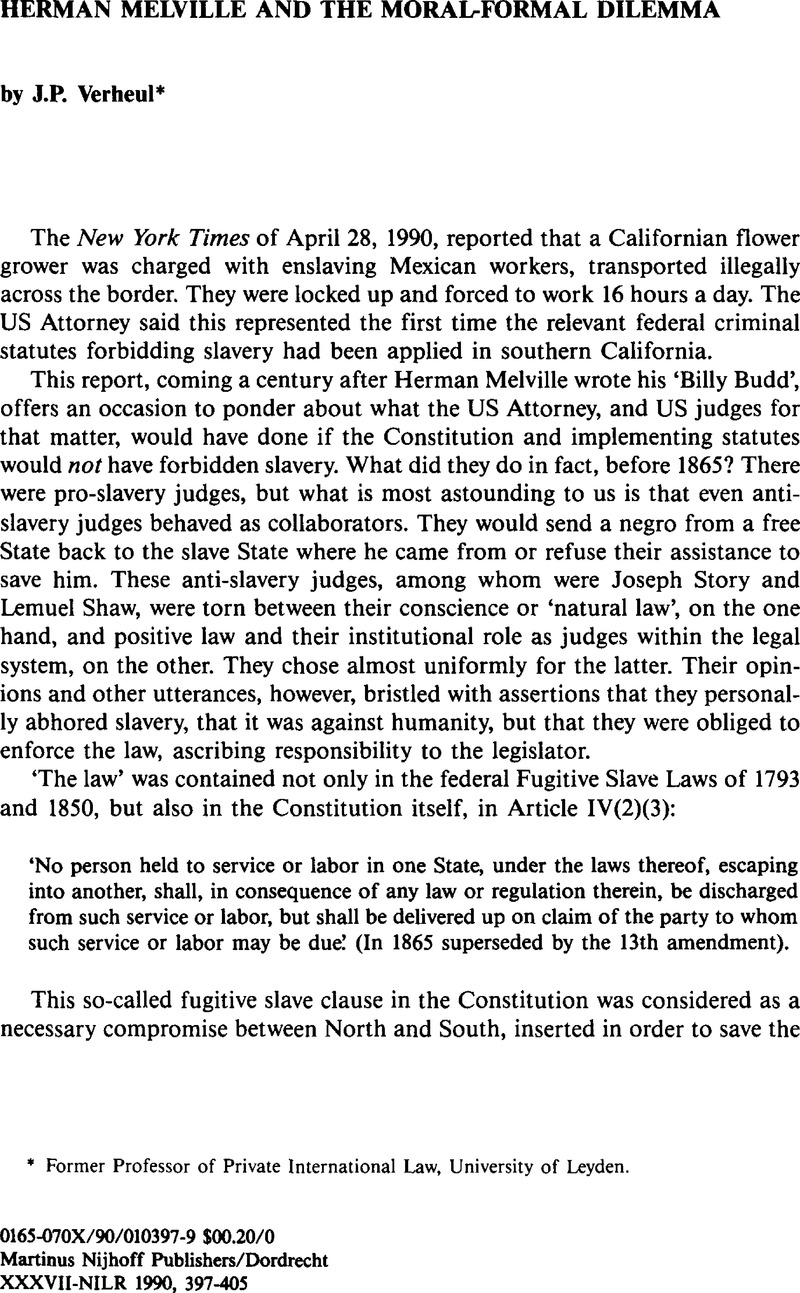No CrossRef data available.
Published online by Cambridge University Press: 21 May 2009

1. Jones v. Van Zandt, 46 US 215,230 (1847).
2. Cover, R.M., Justice Accused. Antislavery and the Judicial Process (1975) p. 5Google Scholar.
3. Scott v. Sandfort, 60 US 393, 407 (1857). See Fehrenbacher, E., The Dred Scott Case (1978) pp. 347, 447Google Scholar.
4. Story, Commentaries on the Constitution (1833) III, p. 205Google Scholar, and as Circuit Judge in US v. La Jeune Eugenie, 2 Mason 409, 26 Fed Cas 832, 845 (1822).
5. 9 Ohio St. 77 (1859). See pp. 198–199.
6. Which was also doubtful, see Sutliff's dissenting opinion, p. 325.
7. Prigg v. Pennsylvania, 16 Peters (41 US) 539, 10 L Ed 1060 (1842). See pp. 611–612 and 622. Story refers to Blackstone!
8. Charge to a grand jury, cited by Cover, supra n. 3, p. 285. Story must have known that Montesquieu gave, ironically, nine justifications for slavery, among which: ‘It is impossible for us to suppose these creatures to be men, because allowing them to be men, a suspicion would follow, that we ourselves are not Christians’ (The Spirit of Laws, trans. Nugent, (1793) p. 179)Google Scholar.
The conflict of laws reasoning on slavery was as follows. The owner of a slave had a vested right, valid under the law of the State where he lived with his slave. Normally, vested rights are recognized in other States, but this one was contrary to the public policy of free States. Consequently, as soon as a slave set foot on the territory of a free State, he became ipso facto a freeman, but for the fugitive slave clause in the Constitution (Commentaries on the Conflict of Laws (1834) pp. 92–93). Since that clause could only be applied to fugitive slaves, the presence of a slave in a free State with the consent of his master led to his liberation according to the said reasoning. However, there were doubts and differences of opinion about a temporary sojourn. To Story it did not seem to make any difference. In the same sense Lemmon v. The People, 20 NY 562 (1860), where slaves, just passing through New York with their owner en route from one slave State to another (Virginia, Texas) were declared free. Clarke, J., dissenting, invoked the law of nations (‘the right of passage with what is recognized as property by that law’, p. 641)Google Scholar. A comparable French case is mentioned by Bynkershoek, , Traité du juge compétent des ambassadeurs, trans. Barbeyrac, (1723) pp. 159–160Google Scholar. A slave owned by the Spanish Ambassador was declared free by the Parlement of Paris owing to his mere presence in France. Bynkershoek disagreed, because of diplomatic immunity which extends to all the people belonging to an ambassador. Again, the law of nations wrongly invoked against natural law.
9. Smith, M.E. in 24 AJCL (1976) p. 143CrossRefGoogle Scholar, in his review of Cover's book.
10. BGH 12 July 1951, 7 BGHZ 94, at p. 107.
11. Hoge Raad (Supreme Court) 5 March 1943, NJ 1943 no. 203. Comment by De Winter, in WPNR 1947 p. 258Google Scholar.
12. Kosters, J., Internationaal burgerlijk recht (1917) pp. 273–274Google Scholar.
13. Cass. 1 April 1981, Clunet 1981 812, overruling Cass. 10 July 1979, Rev. Crit. 1980 91.
14. ECHR 18 December 1986, Series A vol. 112. NJ 1989 no. 97, p. 308.
15. (1977) 3 WLR 532 (CA) and 818 (HL).
16. The procedure in the English High Court of Justice is governed by the Rules of the Supreme Court. These Rules are delegated legislation, made by a Rule Committee and are found, together with guides on interpretation, in the current edition of the Supreme Court Practice (the ‘White Book’).
17. Art. 25 of the Civil Jurisdiction and Judgments Act 1982 c. 27.
18. Cass. 23 April 1969, Rev. Crit. 1969 717. See Schaeffer's note p. 731 et seq., and Bogdan, M., Expropriation in Private International Law (1975) p. 144Google Scholar.
19. The principle was expressly derived by the SC from Art. 545 of the Civil Code: ‘No one can be forced to yield his ownership, unless for public purposes and with just and antecedent compensation’ (trans. Crabb, ) and in this case also from the Treaty with Algeria of 1962Google Scholar.
20. Op. cit. n. 2, p. 105.